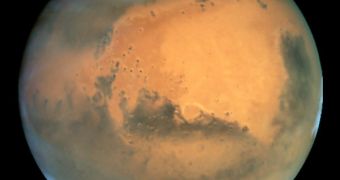According to a new scientific investigation, it would appear that influences from the Sun are directly responsible for why Mars is constantly losing some of its atmosphere to outer space. The research team, which included astrophysicists from the University of Leicester, in the United Kingdom, believes that the star at the center of our solar system may be responsible for emitting large amounts of solar wind pulses, which disturb the Martian atmosphere, and force it to scatter among the stars.
The authors published their new study in a paper appearing in the latest issue of the respected scientific journal Geophysics Research Letters. The investigation was based on datasets collected by the European Space Agency's (ESA) Mars Express missions, but the experts said that they also used some information gathered by a somewhat less known NASA mission called ACE. In charge of the expert team was scientist Niklas Edberg, who was at the time a UL doctoral student, and who is now based at the Swedish Institute for Space Physics (IRF), in Uppsala. Funding for the research came from the EU training Network and the Science and Technology Facilities Council.
The purpose of the study was to analyze the possible correlations between the flux of heavy ions leaving the Martian atmosphere and solar wind data. The experts set out to demonstrate that the two were intimately and directly linked, and they were able to prove this as well. The groups showed that the Martian atmosphere was not escaping the planet in a linear manner, but rather in bursts. These events were found to be synchronized with pulses recorded in solar wind intensity, the team says. This type of solar activity comes from events called corotating interaction regions (CIR).
In these areas, regions of very fast-moving solar winds encounter regions where they move very slowly, and the result of these interactions is a high-pressure pulse that travels away from the Sun, and collides with the planets, moons and asteroids of the solar system. “The main reason it [atmospheric loss] happens at Mars and not at Earth is the lack of a magnetic field produced by the planet, which protects the atmosphere at Earth. One other aspect of this work is that the observations were made during a very quiet period in the eleven year solar cycle and so we would expect the effect of these and other large scale disturbances to be higher at other times in the solar cycle,” the head of the UL Department of Physics and Astronomy, Professor Mark Lester, says.

 14 DAY TRIAL //
14 DAY TRIAL //